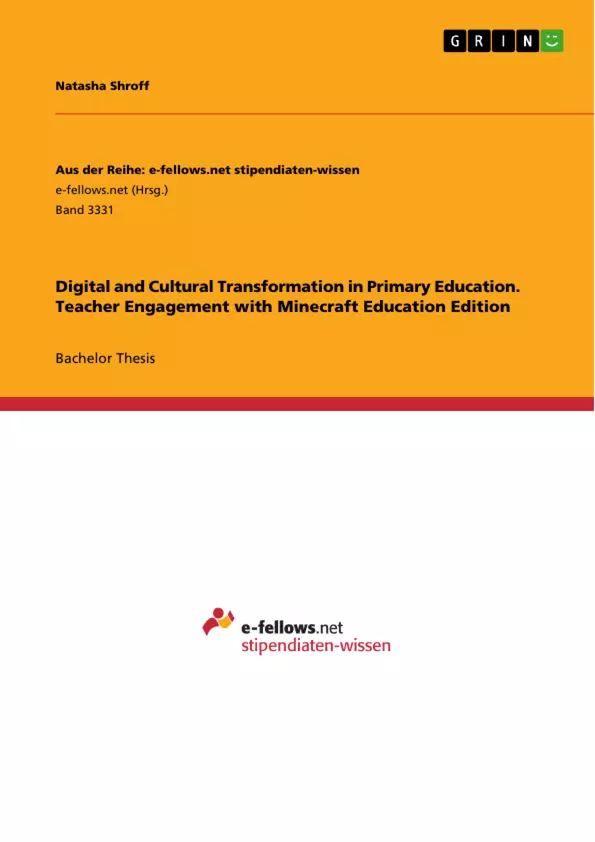With the fast-paced change of society, a transformation of education is vital in preparing today’s students for tomorrow’s challenges such as a technology-based labor market. A concept named 21st century learning has been developed by various stakeholders, to frame the new type of skills required to succeed in the changing business environment. In this study, an investigation into primary school teacher engagement with emerging educational technology has been carried out in the case of Minecraft: Education Edition, a game-based emerging educational technology. The game was selected because it facilitates the learning of 21st century skills and hence provided a suitable choice to test various teacher technology engagement factors on a global scale.
21st century skills were found to focus on students’ knowledge adaption and application rather than the traditional teaching, based on knowledge acquisition and assimilation. Concepts are based on a variety of skills such as basic ICT skills, media literacy to support critical thinking in terms of data and conscious decision-making, informational & computational thinking, as well as the social and emotional learning aspect. The latter being a critical component for graduates to thrive and collaborate in a continuously adapting environment. This digital and cultural transformation requires students to take more responsibility, ownership, and agency over their learning. Hence, time and place independent, student-centered, and flexible learning, are encouraged through 21st century education.
With the transformation of education, new skill requirements for teachers were found to be essential for a 21st century skill transfer in primary schools. Such requirements include high levels of teacher agency, basic digital skills and pedagogical-technological integration competences to take responsibility for the EdTech integration. To apply technology effectively, teachers are recommended to build their ICT self-efficacy, their own beliefs in their digital skills, on a continuous professional learning journey. To increase the latter engagement component, measures such as sharing expertise and experiences in a (global) teacher community as well as pro-actively seeking increased collaboration with teachers and students are recommended.
Inhaltsverzeichnis (Table of Contents)
- Executive Summary
- Table of Contents
- Table of Figures
- Introduction
- Background of the research
- Company description
- Problem and opportunity analysis
- Main research question
- Organization of the report
- Theoretical Framework
- Introduction
- Conceptual framework
- Theoretical perspectives on the topic
- Digital transformation in primary education
- Changing skill requirements for primary school teachers
- Technology acceptance and its barriers in primary education
- Internal drivers of ICT self-efficacy in teachers
- Limitations of selected theory
- Selection of theories
- Conclusion
- Research Methodology
- Introduction
- Research approach, strategy and design
- Key features of 21st century education
- Skill requirements for 21st century education teachers
- Technology acceptance and barriers of Minecraft: EE
- Teacher engagement and Minecraft: Education Edition in the classroom
- ICT self-efficacy and teachers
- Conclusion
- Findings and Analysis
- Introduction
- Topic 1 21st century education
- Social and emotional learning in the classroom
- The challenges of student agency
- Teaching personalized and game-based learning
- 21st century education challenges
- Topic 2 - Skill requirements for teachers using Minecraft: EE
- The importance of teacher agency: a role shift in teaching
- Minecraft: EE teaching requirements
- Topic 3-Technology acceptance and barriers
- Factors related to technology acceptance
- Barriers to technology acceptance
- Topic 4 Teacher engagement with M:EE
- Topic 5 Factors influencing teachers' ICT self-efficacy
- Synthesis of findings
- Conclusion
- Recommendations
- Implementation plan
- Primary school teachers
- Teacher facing roles at Microsoft
- Limitations and further research
- Implementation plan
- Bibliography
Zielsetzung und Themenschwerpunkte (Objectives and Key Themes)
This thesis aims to provide Microsoft Education with an overview of the growth opportunities, challenges, and barriers surrounding teacher engagement with emerging educational technology, utilizing their product Minecraft: Education Edition as a case study. The research focuses on understanding how teachers in primary schools are engaging with this technology, exploring the factors that promote or hinder their adoption.
- Digital transformation in primary education
- The changing skill requirements for teachers in the 21st century
- Technology acceptance and its barriers in primary education
- Teacher engagement with Minecraft: Education Edition
- Factors influencing teachers' ICT self-efficacy
Zusammenfassung der Kapitel (Chapter Summaries)
The thesis begins by introducing the research topic, detailing its relevance and significance in the context of 21st century learning. It then delves into the theoretical framework underpinning the study, exploring key concepts related to digital transformation in education, changing skill requirements for teachers, technology acceptance, and the role of ICT self-efficacy.
The research methodology chapter outlines the approach, strategy, and design of the study, focusing on key features of 21st century education, skill requirements for teachers in this context, technology acceptance and barriers in the context of Minecraft: Education Edition, and the relationship between teacher engagement and ICT self-efficacy.
The findings and analysis chapter presents the results of the qualitative research, which includes interviews, expert conversations, and classroom observations. The analysis focuses on themes such as 21st century education, skill requirements for teachers using Minecraft: Education Edition, technology acceptance and barriers, teacher engagement with Minecraft: Education Edition, and factors influencing teachers' ICT self-efficacy.
The thesis concludes by summarizing the key findings and proposing recommendations for promoting effective integration of Minecraft: Education Edition in primary schools. This includes suggestions for supporting teacher professional development, fostering collaborative learning environments, and addressing the challenges and barriers associated with technology integration in education.
Schlüsselwörter (Keywords)
The key terms and concepts explored in this thesis include digital transformation, 21st century learning, teacher engagement, emerging educational technology, Minecraft: Education Edition, technology acceptance, ICT self-efficacy, and primary education. The research focuses on understanding the factors that influence teachers' adoption and use of Minecraft: Education Edition, emphasizing the importance of teacher agency, professional development, and creating supportive learning environments.
- Quote paper
- Natasha Shroff (Author), 2018, Digital and Cultural Transformation in Primary Education. Teacher Engagement with Minecraft Education Edition, Munich, GRIN Verlag, https://www.grin.com/document/508818



